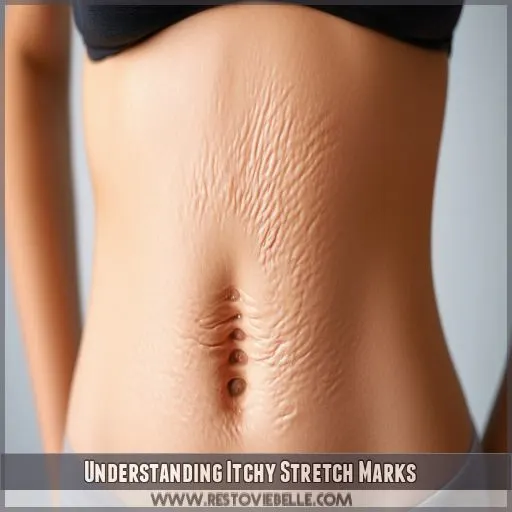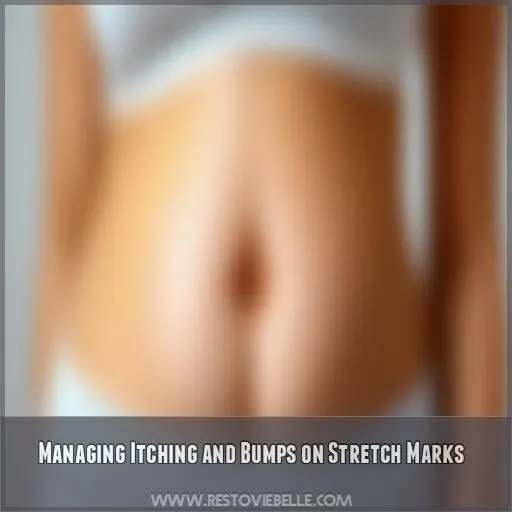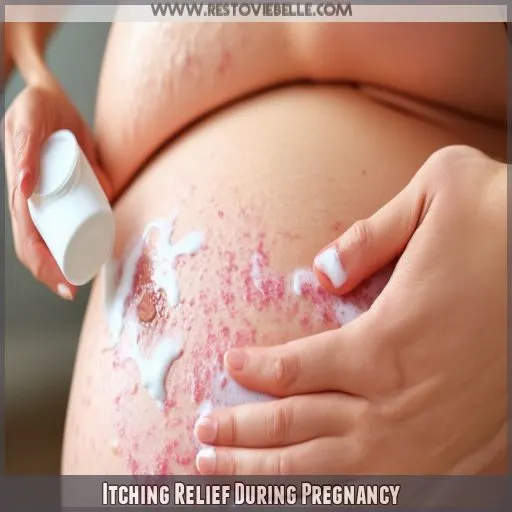This site is supported by our readers. We may earn a commission, at no cost to you, if you purchase through links.
 Irritated by scratchy stretch marks? You are not alone. Exploring the best cream for itchy stretch marks should begin with their causes, from the bump to changes in postpartum.
Irritated by scratchy stretch marks? You are not alone. Exploring the best cream for itchy stretch marks should begin with their causes, from the bump to changes in postpartum.
Such methods are harmless, yet the uneasiness needs a cure. We present evidence-based remedies that help smoothen them, from gentle exfoliating and moisturizing to hydrating.
Take advantage of the very best creams and techniques in this guide regarding how you can reduce itching from occurrences right down to bringing relief to the skin. Use these expert-backed insights to start a much smoother journey.
Table Of Contents
- Key Takeaways
- Understanding Itchy Stretch Marks
- Causes of Itchy Stretch Marks
- Relieving Itchy Stretch Marks
- Effective Creams for Itchy Stretch Marks
- Managing Itching and Bumps on Stretch Marks
- Itching Relief During Pregnancy
- Frequently Asked Questions (FAQs)
- What can I put on stretch marks to stop itching?
- Why do my stretch marks itch and have bumps?
- What cream is good for inflamed stretch marks?
- What is the best cream for itching during pregnancy?
- Are there natural remedies for itchy stretch marks?
- How long do anti-itch creams take to work?
- Can diet impact stretch mark itchiness?
- What are side effects of itch relief creams?
- Do mens itchy stretch marks require different treatments?
- Conclusion
Key Takeaways
- Stretch marks often come with an uninvited guest – itchiness! But don’t worry, there’s a squad of remedies to help you tame those pesky itches.
- Your skin is like a canvas, and stretch marks are just part of its unique story. Embrace them, and use gentle exfoliation to buff away dead skin cells and reveal smoother skin.
- Slather on some super moisturizing creams or oils to give your skin a big hug. Hydration is key for keeping those itches at bay.
- If you’re expecting a little bundle of joy, stretch marks might come along for the ride. Fear not, mama-to-be! Cocoa butter and coconut oil will be your secret weapons against itchy bumps.
Understanding Itchy Stretch Marks
Knowing what itchy stretch marks mean necessitates an understanding of the real meaning of stretch marks. These long, narrow scars develop when your skin stretches rapidly; common causes include pregnancy, puberty, and weight changes.
While stretching, the skin may create tears in the dermis that will further progress to stretch marks. They’re red, pink, or purple at an early stage and can also be pretty itchy. This itchiness can be thought of as your skin reacting to all the fundamental sudden changes; it’s thus a significant discomfort.
Although they’re harmless, handling itchiness is important for comfort. Applying the best cream for itchy stretch marks would help relieve and support the healing process of the skin; hence, the importance of self-care and oriented treatment ways.
Causes of Itchy Stretch Marks
Itchy stretch marks can develop during pregnancy and postpartum due to hormonal changes, skin stretching, and compromised skin barriers. These factors, along with increased sensitivity and dryness, make the skin more prone to irritation and itching.
In Pregnancy
During pregnancy, your body goes through rapid weight gain and hormonal changes that can lead to abdominal stretch marks. These marks often itch due to skin irritation and stretching. Using specialized creams and lotions can help manage itchy skin. Stretch mark prevention with moisturizers is essential to keep your skin hydrated and less prone to irritation.
Postpartum
Postpartum, your itchy stretch marks result from lingering hormonal changes, weight fluctuations, and skin dryness. The skin’s elasticity is compromised, often worsened by stress and labor. Remedy this by hydrating and moisturizing with hyaluronic acid and retinoid creams. Light and laser therapies, along with collagen-stimulating treatments, can also help improve skin elasticity and reduce itchiness.
Relieving Itchy Stretch Marks
To relieve itchy stretch marks, start with gentle exfoliation to remove dead skin cells and then pat your skin dry to avoid further irritation. Apply a soothing moisturizer, focusing on hydration and scar tissue massage, to alleviate itching and promote healing.
Exfoliation Techniques
Exfoliation removes dead skin cells, reducing itchiness related to stretch marks. Use gentle methods to avoid irritation:
- Use lukewarm water: Keeps skin soft.
- Choose gentle exfoliation products: Avoid harsh chemicals.
- Frequency matters: Exfoliate 2-3 times weekly.
- Soft exfoliation tools: Try a washcloth or soft brush.
- Consider skin sensitivity: Adjust according to your skin’s response.
Proper Skin Drying
Pat your skin dry with a soft towel to avoid irritating your skin after scrubbing.
Air drying is even better because it helps to keep the skin smooth and promotes very little water loss from the body.
Take warm water instead of hot showers.
Good soap and drinking enough water helps to keep your skin well-moisturized so it can easily absorb moisture from creams, such as vitamin E or cocoa butter creams.
Appropriate Skin Moisturizing
Now that you’re patting your skin dry jump into moisturizing.
Opt for creams and gels with highly concentrated formulas of hyaluronic acid, vitamin E, and shea butter. Apply while your skin’s still a little damp to lock in hydration. Apply regularly for optimal relief from itchiness during pregnancy and to aid healing.
Keep in mind: well-moisturized skin repels itchy stretch marks.
Scar Tissue Massage
Massaging scar tissue can alleviate itching and improve skin elasticity. Gently rub the area to break up the tissue, promoting collagen stimulation and accelerating the healing process. This helps reduce nerve sensitivity caused by hormonal imbalances. For stubborn red, itchy stretch marks, incorporating techniques like laser resurfacing and stretch mark removal can further enhance results.
Hydration Importance
Proper hydration is critical for skin elasticity. It would translate to promoting collagen and, in some cases, soothing itchy, dry stretch marks. Keeping well hydrated with adequate daily water intake will help to maintain your skin integrity, mainly through periods of weight gain or with systemic diseases like Cushing’s disease.
Hydration, combined with glycolically-based moisturizers, prevents itchy stretch marks and alleviates them in the soothing way.
Effective Creams for Itchy Stretch Marks
The suitable creams count in relieving itchy stretch marks. Some effective ingredients, such as hyaluronic acid, can help skin hydration and reduce itchiness in the best possible manner in a cream. Creams with retinoids derived from vitamin A could improve their appearance in early stretch marks but should be avoided during pregnancy. Natural ways to help soothe include coconut oil and vitamin E for skin sensitivity. Apply these creams daily to moisturize your skin well.
If you have pregnancy-related itching, be sure to check with your doctor before using any products. Adequate treatment coupled with the correct frequency of application could very well be what makes a big difference in keeping discomfort at bay. There are many choices available over-the-counter, but sometimes, professional treatments like chemical peels or lasers may work better in some severe cases.
Managing Itching and Bumps on Stretch Marks
Control of itching and bumps on stretch marks can be done in several ways, which include: Keeping your skin well moisturized with store-bought solutions usually does the trick. Creams enriched with hyaluronic acid or vitamin E have a fine potential to quell itching and ironing out bumps by keeping the skin moist—some home remedies like coconut oil help to reduce irritation.
Alternative therapies, like Centella, may offer some relief, though the proof for these is very variable. One needs to seek medical attention if itching persists, for diseases such as Cushing’s and Marfan may heighten it. Keeping the skin well moisturized and avoiding sudden weight gain or loss are prevention methods. Though stretch marks are dark brown in color initially, they generally tend to fade away with time.
Itching Relief During Pregnancy
Itchiness can be made worse in pregnancy due to hormonal influences and stretched taut skin. Understand the crucial importance of prenatal care to maintain elasticity and reduce discomfort. Apply cocoa butter or coconut oil daily to skin areas prone to itching to soothe stretch marks and improve elasticity.
Weight loss and weight gain elevate the level of stress, which changes the structure of your skin, signaling possible underlying conditions like Cushing’s disease. Rubbing just exacerbates the feeling of discomfort; hence, people resort to alternative medicine measures like almond oil to alleviate this.
Keep yourself well-hydrated by drinking plenty of water. Use mild, fragrance-free cleansers on the skin to help reduce irritation. Consult your provider if itching persists, as what itchy stretch marks mean might be linked with hormonal changes or other concerns related to stress. These steps can help manage itching and its emotional impact.
Frequently Asked Questions (FAQs)
What can I put on stretch marks to stop itching?
Did you know nearly 50% of pregnant women get stretch marks? To stop itching, apply cocoa butter, coconut oil, or anti-itch cortisone cream. These soothe, moisturize, and reduce inflammation, making your skin feel more comfortable.
Why do my stretch marks itch and have bumps?
Your stretch marks itch and have bumps because skin is rapidly stretching, causing micro-tears in the dermis. These tears lead to inflammation, itching, and sometimes small pimple-like bumps, often seen during pregnancy or rapid weight changes.
What cream is good for inflamed stretch marks?
For inflamed stretch marks, try using a cream with hydrocortisone to reduce inflammation and itching. Additionally, creams containing cocoa butter, shea butter, hyaluronic acid, or vitamin E can soothe and moisturize your skin effectively.
What is the best cream for itching during pregnancy?
To soothe itching during pregnancy, you can’t go wrong with cocoa butter or coconut oil. Their moisturizing and anti-inflammatory properties work wonders, quenching your skin’s thirst and calming that relentless itch.
Are there natural remedies for itchy stretch marks?
Natural remedies for itchy stretch marks include applying coconut oil, cocoa butter, or aloe vera gel. These options moisturize the skin, reduce inflammation, and alleviate itching without synthetic chemicals, making them gentle on sensitive areas.
How long do anti-itch creams take to work?
Did you know that 50% of pregnant women experience stretch marks? Anti-itch creams often provide relief within an hour, though results may vary. Apply regularly for consistent symptom management and to soothe your skin effectively.
Can diet impact stretch mark itchiness?
Yes, a balanced diet rich in vitamins A, C, E, and omega-3 fatty acids can improve skin health, potentially reducing itchiness from stretch marks. Stay hydrated and avoid excessive sugar to support skin elasticity.
What are side effects of itch relief creams?
Just like a double-edged sword, itch relief creams can soothe but also cause side effects like skin thinning, irritation, or allergic reactions. Always use them as directed and monitor your skin’s response closely.
Do mens itchy stretch marks require different treatments?
Men’s itchy stretch marks don’t require different treatments. Use moisturizers, anti-itch creams, and hydrating oils to soothe the itch. Products like cocoa butter, coconut oil, and cortisone creams are effective for both men and women.
Conclusion
As many as 90% of pregnant women will experience stretch marks. You aren’t alone.
Relieving the discomfort associated with itchy stretch marks can help you improve your quality of life. Gentle exfoliation, proper moisturizing, and adequate hydration accompanied by the best cream for itchy stretch marks can help reduce itching effectively and smoothen your skin.
These expert-backed recommendations provide a holistic approach to managing stretch marks that guarantee relief and healthier skin.












